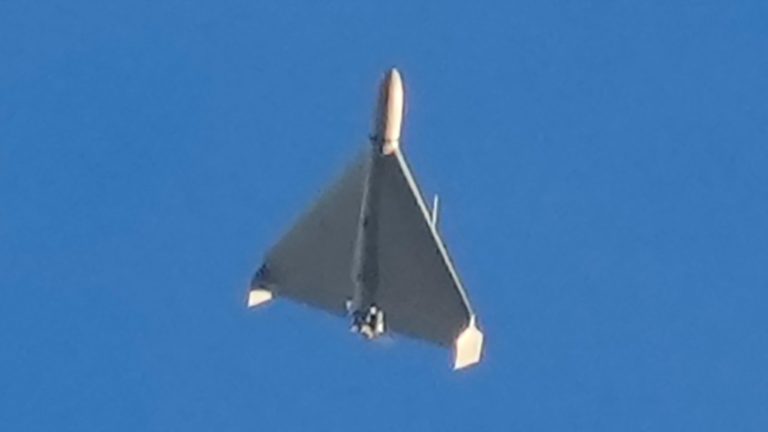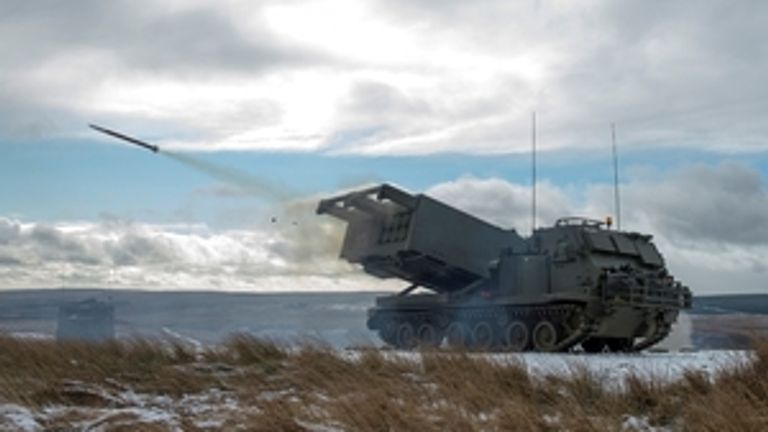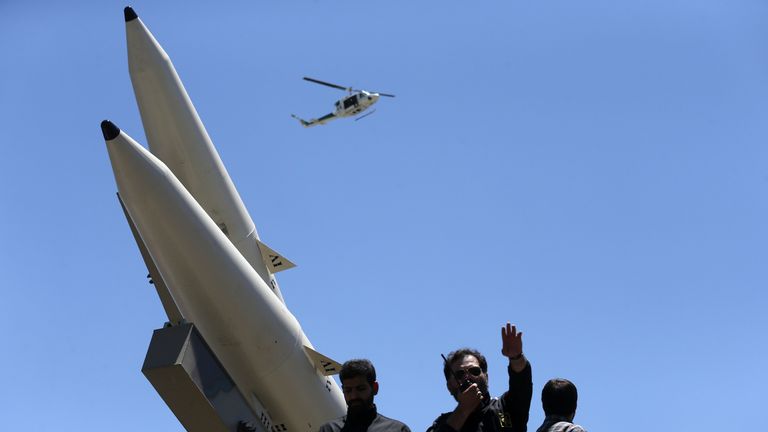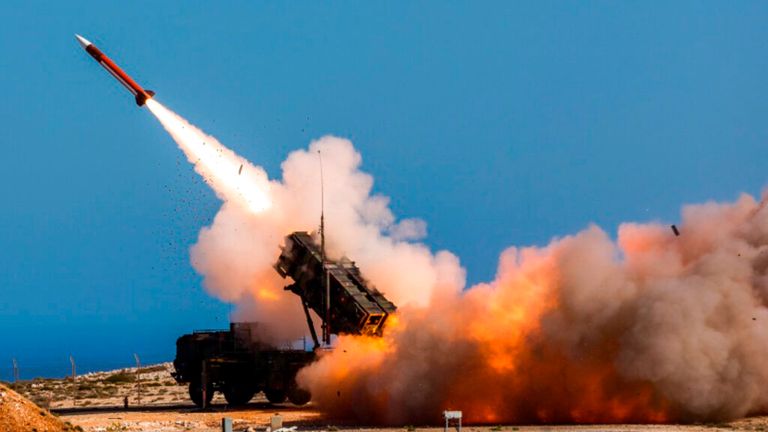An informed security source has claimed that Iran has developed a new attack drone for Russia's war in Ukraine, and appears to be close to supplying Moscow with surface-to-surface missiles.
The Shahed-107 has been described as an “explosive and reconnaissance” unmanned aerial vehicle, likely equipped with technology to search for high-value battlefield targets such as the British and American multiple-launch missile systems used by Ukrainian forces.
The source told Sky News that “a few units” of the specially designed drone may have been on display Russia In a deal estimated to be worth more than $2 million (£1.6 million).
This reflects “the significant work of force determination undertaken by Iran in support of Russian interests in relation to… UkraineThe source said.
Ukraine and its Western allies have done this before Tehran was accused of supplying Moscow with hundreds of one-way attack drones Known as Shahid-131 and Shahid-136 – they are called “suicide drones” because they fly towards targets and explode on impact.
Russia is using a mix of drone and missile strikes to try to penetrate Western-backed Ukrainian air defenses in waves of attacks. Deadly attacks Against civilian and military targets across the country, which has intensified in recent days.
The security source said that the new Shahed-107 drone is from the Shahed-101 family of drones, and has a V-shaped tail.
The source said the drone is about 2.5 meters long with a three-meter wingspan, can be launched from a vehicle and is estimated to have a range of up to 1,500 kilometers (932 miles).
It is believed to be equipped with a direct transmitter for video transmission. These reconnaissance capabilities mean the drone could be used to identify targets on the front line in Ukraine to strike with other drones or weapons systems.
The security source claimed that Iranian security forces conducted an experiment with the Russians at an air base in central Iran that included Shahed-107 and Shahed-136 drones.
The Russian Defense Ministry and the Iranian Foreign Ministry have not yet responded to a request for comment.
In September, the Iranian president denied that his country had sent drones or other weapons to Russia for use in Ukraine.
President Ibrahim Raisi was quoted as saying on the sidelines of the United Nations General Assembly meetings in New York: “We are against the war in Ukraine.”
But Sky News revealed what was alleged last year The arms contract that provided the first compelling evidence that Iran sold munitions to Russia for use in its war effort.
'Great concerns' about Ukraine
A Ukrainian source said the claim about the development of a new type of drone was “most likely true.”
“We have major concerns about potential supplies of the mentioned types of drones,” the source said.
“The Russian attack relies a lot on Iranian drones, and is constantly upgrading them. They are trying to make them faster to force the Ukrainian defense forces to use more expensive air defense systems.”
Read more:
Russia and Ukraine are running out of ammunition
Vladimir Putin has pledged to support soldiers who “defend” Russia
The Ukrainian source said that Russia is now able to assemble the Shahed-136 systems itself at a facility in the Tatarstan region, 500 miles east of Ukraine. Moscow.
Manufacturing capacity [by] The source said: September 2025 should be about 4,000 pieces per year.
If confirmed, defense experts said Iran's development of a new drone would underscore its growing military manufacturing capabilities and its importance to the Russian war effort.
“The political costs to Iran are very large because this places Iran firmly in the camp of those trying to violently overthrow the current international order,” warned Michael Clarke, a visiting professor at King's College London.
Iran is “close” to providing ballistic missiles
The partnership will become more important as Iran delivers surface-to-surface ballistic missiles to Russia – which are more lethal and more difficult to shoot down than drones.
An informed security source said: “It appears from reliable information that Iran and Russia have renewed the arms deal, and Russia expects to receive, soon, accurate surface-to-surface missile systems.”
This includes missiles with a range of more than 300 kilometers (186 miles).
A US official was quoted earlier this month by US media as also saying that Iran was preparing to begin providing short-range ballistic missiles to Russia.
The Iranian regime, amid the threat of further sanctions and international isolation, had previously refrained from providing its massive stockpile of precision-guided missiles since the start of Russia's large-scale invasion of Ukraine in February 2022.
However, its calculations appear to be changing after the end of UN Security Council sanctions last October aimed at curbing Iran's ballistic missile program as part of the key 2015 nuclear deal with world powers that has since collapsed.
The apparent shift in policy also comes War in the Middle East This is shifting the West's attention away from Ukraine, even as the Russian offensive on the ground intensifies again.
The Ukrainian source said that the transfer of Iranian missiles would help Russia repeat the terror campaign it began last winter Against the energy infrastructure of Ukrainecausing prolonged power outages across the country at a time of freezing temperatures.
This type of system could include short-range Ababil tactical missiles owned by Tehran or the Fatah group, which have a slightly longer range of 300 kilometers to 700 kilometers (186 miles to 435 miles), according to Fabian Hinz, a research fellow at the international center. Institute for Strategic Studies (IISS) Research Centre.
“They could hit targets in the whole of Ukraine with precision in this case,” he told Sky News.
Ballistic missiles are difficult to intercept, so this will force the Ukrainian military to use more of its limited supply of US-supplied Patriot air defense missiles, which have a limited range.
Hind said that Patriot batteries “cannot protect every spot in Ukraine from ballistic missile attacks.”
“So the Russians can take advantage of this situation to cause a great deal of destruction when it comes to civilian infrastructure, for example.”
In return, Iran would likely seek funds and military technology from Russia.
Clark, the visiting professor, said the expected delivery of the missiles indicates that Iran has “decided strategically, I think, to cooperate with Russia, and implicitly, also with China, because it sees the realignment of global politics taking place before we see it.” “Their eyes, and they think this will help put them on the side that will win in the end.”





